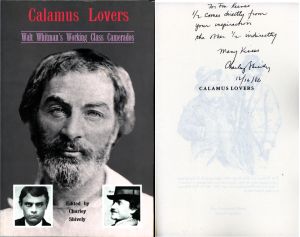Charles Shively

Charles "Charley" Shively, (Born 1937; Died Oct 6th, 2017, Cambridge, Massachusetts), was a gay activist and major figure of the post-Stonewall gay liberation movement, described as "one of the pivotal figures in the Gay Liberation Movement".[1] His most well-known scholarship focused on gay / pederast icon Walt Whitman, arguing that Whitman was in-fact a homosexual, whose relations sometimes involves large age gaps. Academics[2][3] and gay icons[4][5] alike agree, with Shively having published two books on the topic: Calamus Lovers: Walt Whitman's Working Class Camerados (1987)[6] - featuring the chapter Walt Whitman and Bill Duckett: Man/Boy Lovers[7] - and Drum Beats: Walt Whitman’s Civil War Boy Lovers (1989).
To his contemporaries, Shively was known in-part for his 1977 Boston Gay Pride March keynote speech, where he burned his Harvard degree and pages from the Bible, in protest of oppressive institutions. Growing up dirt-poor in rural Ohio, he earned a PhD in history at Harvard, and spent his career teaching first at Boston State University and later at the University of Massachusetts, Boston.
In 1971, he helped form the Fag Rag Collective, which published the first national post-Stonewall gay political journal, Fag Rag, from 1971 to 1987. In Fag Rag Shively published a series of twelve essays, beginning with "Cocksucking as an Act of Revolution", and continuing with such titles as "Indiscriminate Promiscuity as an Act of Revolution," "Bestiality as an Act of Revolution," and "Incest as an Act of Revolution". Michael Bronkski describes these writings as "an idiosyncratic and unabashed vision of queerness as an egalitarian, feminist, anti-capitalist, race-conscious, and defiantly countercultural force. His essays were confessional and adventurous, and drew examples from his own sex life to bolster his structural critiques. That sensibility was in line with the slogan of second-wave feminism, "The personal is political," and it sustained Fag Rag for thirty issues".[8] Fag Rag supported "what it characterized as adolescents' right to sexual freedom, as well as consensual sex between adults and children"[9] with prominent contributors to the paper including NAMBLA supporters such as NAMBLA co-founder Tom Reeves, the poet Allen Ginsberg, and political icon Gore Vidal.
In 1972, the Fag Rag collective codified its political objectives when Shively and a few associates drove to Miami to deliver a list of ten demands to the Democratic National Convention. Broad enough to include all people of any age, their requests included:
- An end to discrimination based on biology; no government agency should record age, skin color, or gender
- An end to discrimination based on sexual preference
- An end to the traditional family, which should be replaced by cooperative parenting
- A guaranteed annual income for all Americans; the wealth of straight white men should be redistributed
- The disbanding of all armed forces and uniformed police, including the FBI, CIA, IRS, and narcotics squads
- The legalization of sex between all consenting individuals
- Self-government and self-determination of all people[10]
During the 1970s and 80s, Shively was involved in numerous LGBT organizations, was a founding member of Gay and Lesbian Advocates and Defenders (GLAD), and, along with Fag Rag, wrote frequently for Gay Sunshine, and the MAP sympathetic Gay Community News and The Guide.
External Links
- Michael Bronski, The Last Gay Liberationist (Boston Review, December 20, 2017).
- Jim Downs, For Charley Shively, Gay Liberation Was About Sex and Rebellion, Not Equality (Slate, Oct 12, 2017).
- Charles Shively, FBI Memorandum (Archive.org).
- Bronski, In Remembrance: Charles Shively, a Pivotal Figure in the Gay Liberation Movement (Lambda Literary, November 9, 2017).
See also
References
- ↑ Michael Bronski, Charles Shively, Pioneer Activist and Author, Gay and Lesbian Review (Jan-Feb 2018 Issue).
- ↑ Rachel Hope Cleves, Unspeakable: A Life Beyond Sexual Morality (Chicago: University of Chicago Press, 2020, p. 6).
- ↑ Kadji Amin. Disturbing attachments: Genet, modern pederasty, and queer history. Duke University Press, 2017.
- ↑ See our page on Jim Kepner
- ↑ See our page on Allen Ginsberg.
- ↑ Calamus Lovers: Walt Whitman's Working Class Camerados (Annas Archive PDF)
- ↑ Walt Whitman and Bill Duckett: Man/Boy Lovers - NAMBLA Website.
- ↑ Jeremy Lybarger, Fag Rag: The 70s paper of gay political revolution. (Columbia Journalism Review, September 11, 2020).
- ↑ Ibid.
- ↑ Ibid.
